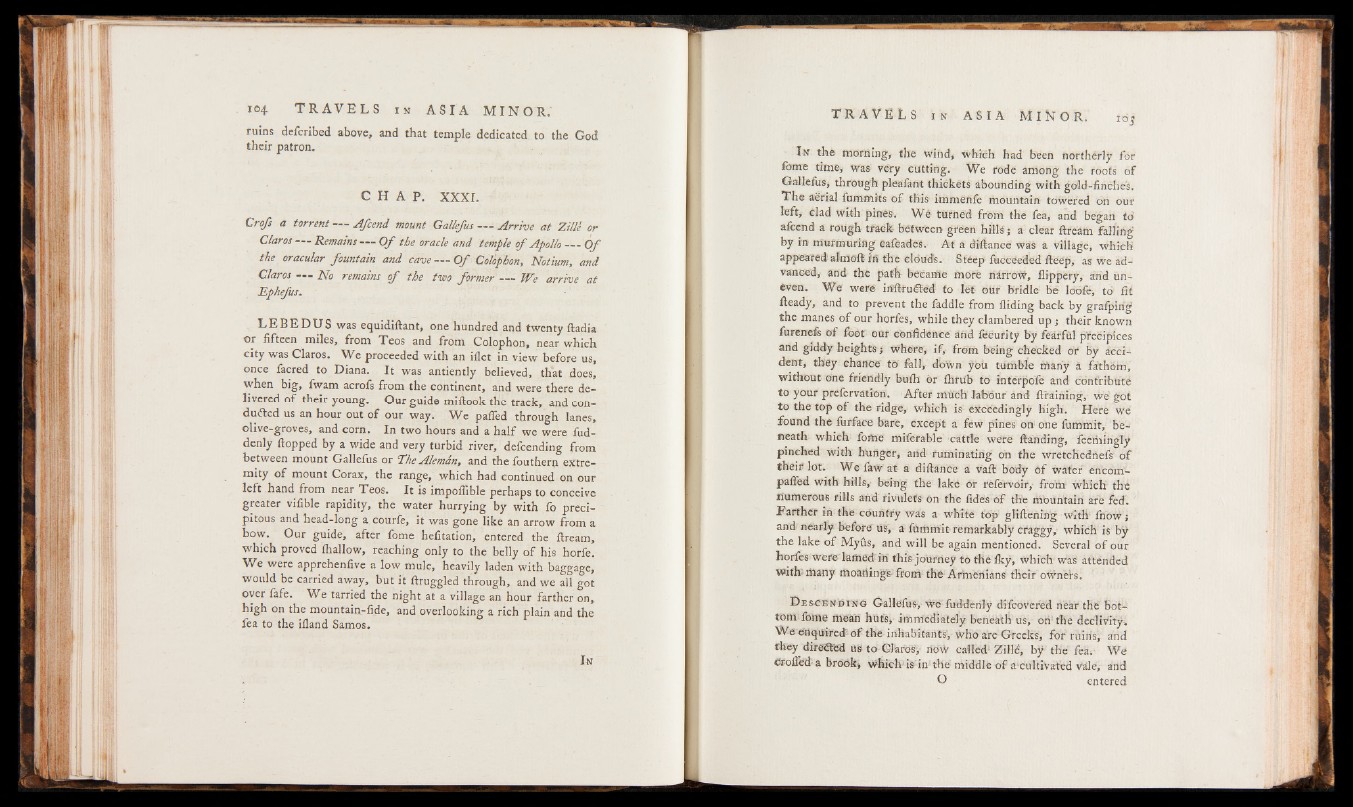
ruins defcribed above, and that temple dedicated to the God
their patron.
C H A P . XXXI.
Crofs a torrent — Afcend mount Gal/efus — Arrive at Z illi or
Claros — Remains — O f the oracle and temple o f Apollo — O f
the oracular fountain and cave — O f Colophon, Notium, and
Claros — No remains o f the two former — We arrive at
JLphefus+
L E B EDUS was equidiftant, one hundred and twenty fladia
or fifteen miles, from Teos and from Colophon, near which
city was Claros. We proceeded with an iilet in view before us,
once facred to Diana. It was antiently believed, that does,
when big, fwam acrofs from the continent, and were there delivered
of their young. Our guide miftook the track, and conducted
us an hour out of our way. We palled through lanes,
olive-groves, and corn. In two hours and a half we were fud-
denly flopped by a wide and very turbid river, defending from
between mount Gallefus or T'he Aleman, and the fouthern extremity
of mount Corax, the range, which had continued on our
left hand from near Teos. It is impofiible perhaps to conceive
greater vifible rapidity, the water hurrying by with fo precipitous
and head-long a courfe, it was gone like an arrow from a
bow. Our guide, after fome hefitation, entered the ftream,
which proved lhallow, reaching only to the belly of his horfe.
We were apprehenfive a low mule, heavily laden with baggage,
would be carried away, but it ftruggled through, and we all got
over fafe. We tarried the night at a village an hour farther on,
high on the mountain-fide, and overlooking a rich plain and the
fea to the illand Samos.
In
In the morning, the wind, which had been northerly for
fome time, was very cutting. We rode among the roots of
Gaillefus, through plealant thickets abounding with gold-finches.
The aerial fummks of this immenfe mountain towered on our
left, clad With pines. Wé turned from the fea, and began to
afeend a rough track between green hills; a clear ftream falling
by in murmuring eafcadeS. At a diftance waS a village, which
appeared almeft in the elöuds. Steep fuecéeded flëép, as we advanced,
and the path beéame moré nérioW, flippery, and uneven.
We were inftruSed to lét our bridle be loofe, to fit
fteady, and to prevent the faddle from Hiding back by grafpirig
the manes of our horfes, while they clambered up j their known
furenefs of foot our confidence arid fecurity by fearful precipices
and giddy heights , where, if, from being checked of By accident,
they chance to fell, down you tumble many a fathom,
without One friendly bufh or ihru'b to intefpofie and contribute
to your prefervation. After much labour and draining, Wé got
to the top of the ridge, which is exceedingly high. Here wé
found the furfaee bare, except a féw pines on one fummit, beneath
which fome miferable cattle were ftanding, feemirigly
pinched with hunger, and ruminating on the wretchedfiefs of
their lot. Wefawat- a diftance a Vaft body Of water encom-
paflèd With hills, being the lake or refervoir, from which the
numerous rills and rivulets on the fides of the mountain are fed.
Farther in thé country was a white fop gliflening with fnow j
and nearly before us, a fummit remarkably craggy, which is by
the lake of Myüs, and will be again mentioned. Several of our
horfes were lamed in this-journey to the fky, which was" attended
witfciiiany raoaiiing's-from the Armenians' their ovVnefS.
D escending Gallefus, We fuddeiily difeovered near the bót-;
tom fome mean huts, immediately beneath us; on'the declivity,
We enquired-of the: inhabitants, who are Greeks, for ruins; and
they direStëd üStoGJaros', ricnV called1 Zillé, by the fea. We
crofiefl a brook, which1 is'in1 the middle o f aUultivated Vale, and
O entered